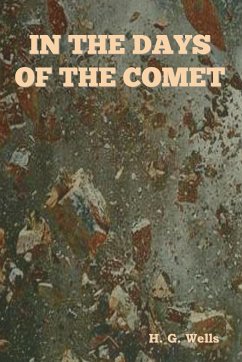Description: In the Days of the Comet is a science fiction novel by H.G. Wells in which the vapors of a comet are used as a device which brings about a profound and lasting transformation in the attitudes and perspectives of humankind. Herbert George is best known for his work in the science fiction genre. He was also a prolific writer in many genres, including contemporary novels, history, politics and social commentary. Together with Jules Verne, Wells has been referred to as "The Father of Science Fiction". BIO: Herbert George Wells (21 September 1866 - 13 August 1946) was an English author, best known for his work in the science fiction genre. He was also a prolific writer in many genres, including contemporary novels, history, politics and social commentary. Together with Jules Verne, Wells has been referred to as "The Father of Science Fiction". Wells was an outspoken socialist and sympathetic to pacifist views, although he supported the First World War once it was under way, and his later works became increasingly political and didactic. His middle period novels (1900-1920) were less science-fictional; they covered lower-middle class life (The History of Mr. Polly) and the 'New Woman' and the Suffragettes (Ann Veronica). Herbert George Wells ' science fiction stories have been filmed many times. H.G. Wells's best known works are THE TIME MACHINE (1895), one of the first modern science fiction stories, THE INVISIBLE MAN (1897), and THE WAR OF THE WORLDS (1898). Wells wrote over a hundred of books, about fifty of them novels. "No one would have believed, in the last years of the nineteenth century, that human affairs were being watched keenly and closely by intelligences greater than man's and yet as mortal as his own; that as men busied themselves about their affairs they were scrutinized and studied, perhaps almost as narrowly as a man with a microscope might scrutinize the transient creatures that swarm and multiply in a drop of water." (from War of the Worlds) Wells lived through World War II in his house on Regent's Park, refusing to let the blitz drive him out of London. His last book, MIND AT THE END OF ITS TETHER (1945), was about mankind's future prospects, which he had always viewed with pessimism. "Human history becomes more and more a race between education and catastrophe," he wrote already in The Outline of History. Wells died in London on August 13. 1946.
Bitte wählen Sie Ihr Anliegen aus.
Rechnungen
Retourenschein anfordern
Bestellstatus
Storno








